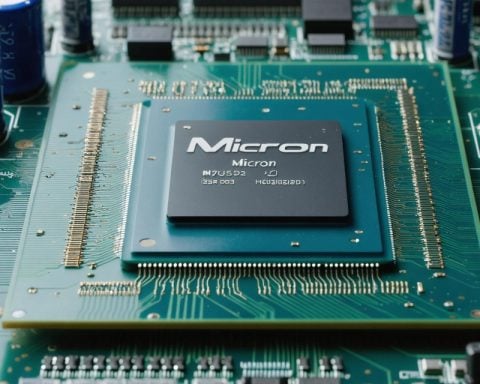In recent market maneuvers, Warren Buffett, the legendary investor, has made some surprising moves regarding his extensive stock portfolio. While known for his commitment to holding stocks long-term, Buffett’s Berkshire Hathaway has raised eyebrows with substantial sales of Apple Inc. (NASDAQ:AAPL) shares. However, Apple still remains a monumental piece of Buffet’s investment strategy.
Buffett’s investment journey transformed significantly when he acquired the then-struggling textile company, Berkshire Hathaway, in the 1960s. Under his leadership, the company diversified and evolved into a powerhouse with an astonishing portfolio worth over $266 billion in equities and a staggering $325.2 billion in cash reserves. Much of this success is attributed to Buffett’s strategic prowess and caution, especially during volatile markets.
In the current economic climate, marked by high interest rates and economic uncertainty, Buffett’s guard remains up. Reflecting a defensive stance, Berkshire has been a consistent net seller over the past two years, shedding $36.1 billion in stocks in Q3 2024 alone, indicating Buffett’s apprehension about current market valuations.
Despite a $14.34 billion reduction in Apple shares, the company continues to be Berkshire’s most significant holding, valued at nearly $70 billion. Apple has performed strongly, with a record $85.8 billion in June quarter revenue, driven by robust product and service sales, highlighting its enduring appeal.
Analysts remain neutral yet optimistic about Apple’s prospects, predicting earnings in line with expectations. The cautious yet calculated approach to stock selling underscores Buffett’s balanced investment philosophy as his firm navigates through economic uncertainty, continuing to analyze opportunities for stable and strategic investments.
Warren Buffett’s Surprising Moves: What It Means Beyond Berkshire Hathaway
Warren Buffett’s investment strategies often garner significant attention worldwide, serving as a bellwether for economic confidence and foresight. However, recent actions by his conglomerate, Berkshire Hathaway, reveal a more nuanced approach than simply buying and holding stocks indefinitely. This shift has ripple effects not only on financial markets but also on how communities, industries, and even countries perceive and react to economic shifts.
Buffett’s Broader Impact on Financial Markets
While much of the focus has been on the divestment from Apple, it’s worthwhile to explore how such decisions influence broader market behaviors. With Berkshire Hathaway acting as a substantial net seller recently, it signals a potential re-evaluation of market valuations across various sectors. This kind of movement can have a domino effect, prompting other institutional investors and even individual investors to reconsider their portfolios.
Influence on Technology and Innovation
Interestingly, despite reducing Apple holdings, Buffett’s action subtly acknowledges the disruptive potential of technology companies. Apple, along with similar tech giants, continues to shape modern life, driving technological advancement and fostering innovation hubs worldwide. This investment behaviour signals confidence in tech’s long-term trajectory, despite short-term pitfalls—crucial for towns and cities heavily reliant on tech industries for employment and economic growth.
Advantages and Disadvantages of Buffett’s Strategy
A key advantage of Buffett’s strategy is risk mitigation. By selling off shares in economic uncertainty, he ensures liquidity and protects investments from volatile fluctuations. This approach can reassure stakeholders in the markets, from pension funds to small-scale investors, that financial prudence remains essential.
Conversely, the downside may manifest in decreased investor confidence or speculative panic. When an iconic investor signals caution, it may lead others to withdraw investments or hold back on funding promising ventures, potentially stifling innovation and economic expansion.
Questions Arising from Buffett’s Moves
One may wonder: “Why sell Apple shares now?” The move, some argue, could reflect a strategic rotation toward undervalued sectors or assets, illustrating foresight rather than retreat. Another pertinent question is: “What does this mean for everyday investors?” For those looking up to Buffett for cues, it emphasizes the importance of diversification and vigilance.
Challenges and Opportunities for Communities
In areas economically tethered to major corporations like Apple or affected sectors, such investment strategies can carry substantial weight. Many regions benefit from Apple’s extensive supply chain and consumer base. Therefore, understanding investment flows helps such communities anticipate and prepare for economic shifts, tailoring local strategies for economic resilience.
For further insights into Buffett’s investment philosophy and Berkshire Hathaway’s portfolio dynamics, you can visit Berkshire Hathaway.
In conclusion, Warren Buffett’s strategic maneuvers have comprehensive effects that stretch beyond mere numbers. They influence market sentiment, stimulate analysis about industry health, and underline the perpetual need for balanced and informed investment strategies. This realignment in strategy is a reminder of the evolving landscape, continuing to highlight the intricate links between global finance, local economies, and the pressing need for adaptive foresight.























